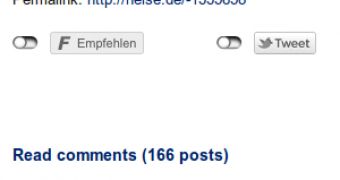Last month, the Facebook Like button was declared illegal in a German state. The state's data privacy regulator argued that the fact that it sent visitor data back to Facebook every time someone loaded a page with the Like button was a violation of user privacy and threatened websites in the area with fines if they did not remove the button.
Of course, the Like button has become a great way of promoting content and few websites would want to remove a valuable traffic source.
So they came up with a solution that manages to appease everyone, even Facebook, reluctantly.
The German news site Heise Online implemented what it called a 2-click system. In place of the regular Facebook Like button, a static image is loaded and users have to first click on the grayed-out version to enable the Like button.
Only then any data is sent to Facebook and the number of likes is retrieved. Users can then like the article as they normally would.
The simple solution ensures that no user data is sent without knowledge or consent. Only after users explicitly express their desire to click on the Facebook Like button any data is sent.
This addresses the main concern of privacy officials, the feature is now opt-in rather than enabled by default.
The solution proved so popular that hundreds of websites in the region contacted the newspaper to inquire about it and many deployed similar solutions.
Facebook didn't like the move initially, saying that it violated its terms of service. However, Facebook had a problem with the use of the Like button appearance by the site, in the grayed out version, not the fact that users had to click to enable the button.
The site changed the graphics so that it didn't use Facebook's own images, which was enough for the social network to say that it's OK with the changes.

 14 DAY TRIAL //
14 DAY TRIAL //